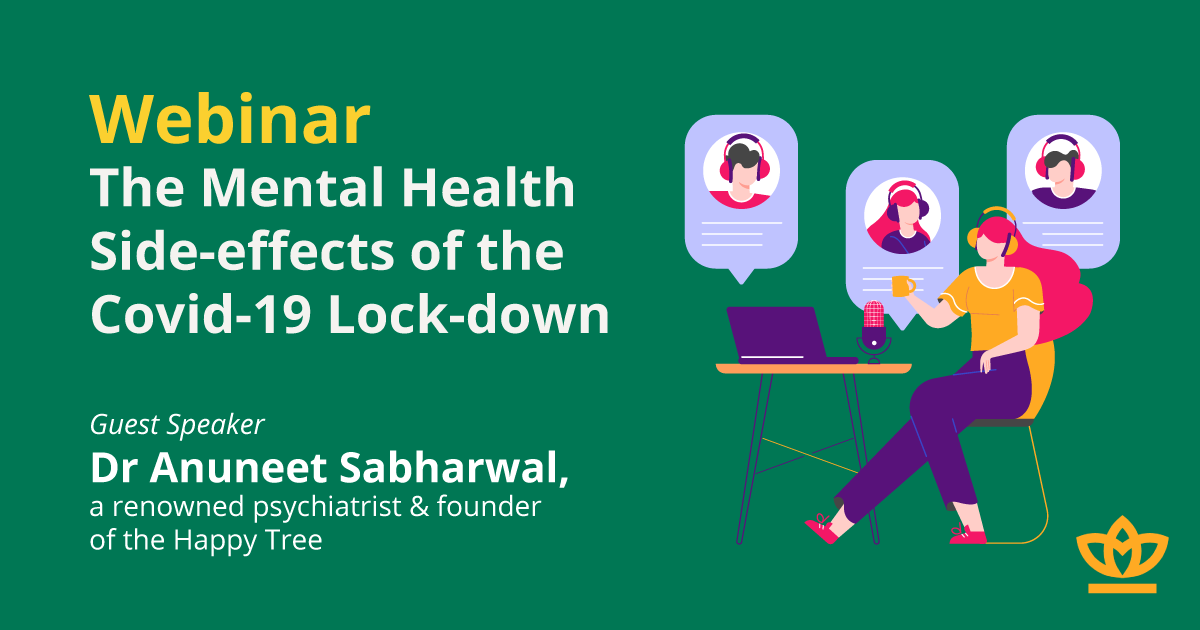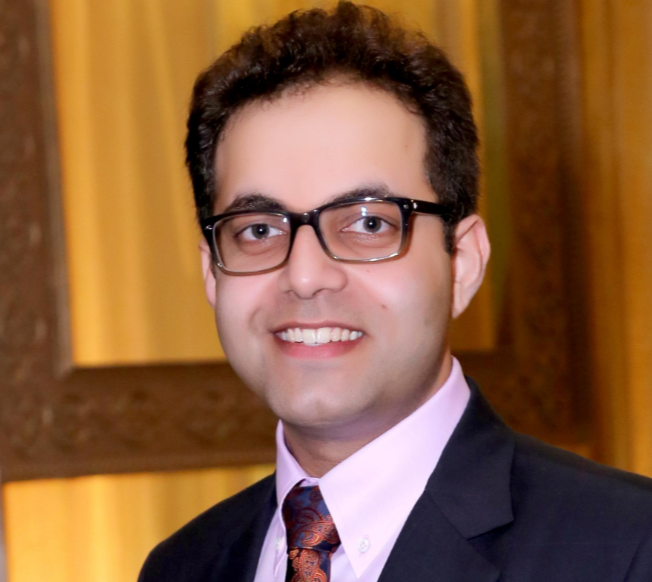Webinar – The Mental Health Side-effects of the Covid-19 Lock-down

Disclaimer: We do not encourage alcohol consumption, cigarette smoking or any other form of drug intake.
In our weekly webinars, we talk about various industry scenarios and challenges of rehabs across the country along with the de-addiction and mental health challenges faced by the mental health community and people in general.

In the third webinar of the series, we invited Dr Anuneet Sabharwal from The Happy Tree, who is one of the top psychiatrists on Practo.
The webinar was hosted by Mr Vikram Kumar – Managing Director of RehabPath, India. In the webinar, Dr Sabharwal shared his opinions on difficult access to rehabs, effects of the ban on alcohol and dealing with withdrawals under the COVID-19 lockdown.
In this blog, you can read the summarised version of the webinar, or you can watch it online here.
Vikram – Tell us more about you and The Happy Tree.
Dr Sabharwal – I am a psychiatrist, and I run an OPD centre called The Happy Tree in Delhi. I may be a psychiatrist by profession, but my passion is public speaking and spreading awareness about mental health. I suppose I have crossed writing 150 articles on the same. I also counsel for mental health, non-medical and non-pharmacological issues. De-addiction is one of them. I understand that de-addiction does require a specific set of medications, but also requires an augmented response from us.
If we look at global statistics, there are about 80% of patients of drug abuse who end up in relapse. To tackle this challenge, you have to think outside the box and augment your current methods and modalities. That’s where I feel a combination of counselling, medication, and neuro-modulation can help bring the statistic down. A problem with managing de-addiction at the moment is, they use one of the three methods, and nobody uses all of them in force. But, a lot of patients can not either afford them or have time for availing all the three options. It is something that I’m bringing to the table; my setup is almost ready. Due to lockdown, I wasn’t able to; else it was due to start in April. We should be able to begin in July. It’s an exciting project with a 31-bed psychiatric facility. Also, I’m looking forward to managing it not only in Delhi but across the country at affordable rates.
Vikram – Can you help us understand the challenges you and the patients are facing in this time of Coronavirus outbreak?
Dr Sabharwal – 50% of my practice is based on de-addiction. I have many patients who come from out of state. Due to lockdown, every state has become a unit in itself as the borders are sealed. It’s not the case that de-addiction medication or drugs are not available in other states; they are. Patients place their trust in dangerous medications, and in the middle of the course, they don’t want to switch doctors or get any other medications. It is why they want to visit the same doctor, but the situation is not allowing them to do so. Last week, a patient who was having seizures from withdrawal was not able to visit me for the same reason. For this, I have been doing lots of video conferencing to help my patients. But the effect of in-person treatment can’t be replicated.
Vikram – Do you have any idea when you will be able to start your project? Will it require a month to launch or more?
Dr Sabharwal – My target right now is 2nd of July, which also happens to be my birth date. I want to do everything in my power to start it again, but circumstances are not favourable right now. Since Delhi is not doing very well with the coronavirus outbreak, I can only hope for the best.
Vikram – While going through your Practo page, I saw there were slots available to book an appointment with you. How is the inflow of patients at your outpatient setup right now?
Dr Sabharwal – My clinic has always been open during these times as it is an essential service. Initially, the inflow was negligible. Now that the lockdown is being eased everywhere, I’m seeing some patient inflow. The patients who suffer from anxiety, depression, and withdrawal symptoms, they need help and medications. Some of them are taking the risk, biting the bullet and visiting my clinic to get the help.
Note – If you are looking for a reliable, authentic, & unbiased information related to rehab centres providing online counselling and therapy across India, you can find the information h
Vikram – We have been under lockdown for a month now, accompanied by a ban on the sale of alcohol and cigarettes. How do you think lockdown has affected regular consumers in India except for the ones who are facing addiction problems?
Dr Sabharwal – I’m pleased that cigarettes are not available. It causes extreme withdrawals. I’m sure many smokers have already passed that stage by now. If the same continues for a little longer, they can quit, as tobacco is not available in any form right now. As far as alcohol is concerned, it can be an issue because alcohol withdrawals can be lethal, in some cases, even fatal. Having said that, all clinics and emergency services are open. If a person is having alcohol withdrawals, best is to consult a psychiatrist. This is the best time to quit alcohol as there won’t be any other time like this.
Vikram – Has the lockdown led to an increase in the number of enquiries over the phone, in-person or through any other channel?
Dr Sabharwal – My de-addiction practice is mostly based on opioids and heroin. There has been a humongous increase in queries because withdrawals of any substance can even paralyze a person. Speaking from my patient’s experience, the numbers have gone up.
Vikram – What are your views on smokers in general? Do you think it is easy to manage the craving for smoking as compared to alcohol or any other drug?
Dr Sabharwal – Smoking or tobacco is harder to quit than any other substance. However, if you look at today’s scenario, a person who’s not able to stop right now may not be able to do it later. The prevailing situation of the world makes it the best time to quit smoking. The best part is, since it is a complete shutdown, there are no restaurants or pubs open to fuel your smoking habits. All that is open are fruit and vegetable vendors and similar other necessary items. Lockdown is forcing you to reconsider healthcare.
Vikram – What would you suggest for a person who has been a smoker for a long time now?
Dr Sabharwal – A cigarette craving lasts from anywhere between 30 seconds to 3 minutes. If you pass this stage, you will be able to manage the rest of it. In the first week, this particular time frame can vary throughout the day in which you can have cravings depending on your cigarette smoking numbers in the past. As the week goes by, these cravings decline. As per literature, with one year of quitting smoking the average weight gain is about 5-7 kgs. Do not worry about weight gain. However, you can replace your daily cigarette with healthy food or anything that does not harm your body. Remember, an 80 kg smoker is as healthy as 140 kg non-smoker. After 6 months of quitting smoking, you will be way healthier than before.
Vikram – Do you think there is a rise in the number of people looking for rehabs or similar facilities?
Dr Sabharwal – I won’t be able to give views on rehab inpatient queries, I’m assuming it must also have been stalled due to lockdown guidelines and the fear of COVID-19. But detoxification on an OPD basis has picked up. In this situation, even your home is as good or bad as a rehab. I’m a hardcore believer of proper medications for detoxification as they are beneficial. I’m assuming query numbers have gone down for inpatients, but for outpatients, it must have probably picked up.
Vikram – Once operational after the lockdown is over, should rehabs expect an increased number of inpatients or will people stay at home?
Dr Sabharwal – It is something I have also been thinking about, recently. I think it will dip for a couple of months and then explode. In my opinion, people will quit the substance right now for the time being. However, since 80% of patients end up relapsing, that’s when the number explosion is going to happen. I’m convinced that it will happen somewhere later this year. I advise rehab people to stay put as unfortunately, we know it will happen.
Vikram – Do you think alcohol or cigarette shops should be open in India as in the US? Should there be any policy regarding the same?
Dr Sabharwal – I think tobacco should be banned in all forms for using it on a commercial basis. It is an excellent initiative that the government has banned chewing tobacco though in fear of coronavirus. We don’t realize the fact that cigarette butts have saliva, which can also be responsible for contracting the virus. I think as a policy, the government should look towards being tobacco-free. As far as alcohol is concerned, the shops should be opened because less than 5% of people consuming alcohol turn out to be a patient of alcoholism. Also, home delivery of alcohol can be managed easily as you only have to check a person’s ID to know they are in the legal age of drinking. It is safe and also promotes a digital economy.
Vikram – If I think about it, the first image crossing my mind is of a gathering where alcohol is consumed. Can alcohol shops be allowed to open during such times? What will be your take on this?
Dr Sabharwal – Here I’m only referring to people who use it once a week or a couple of drinks only to relax and enjoy. I’m not looking at partying or having a gathering, especially in today’s scenario. I’m definitely against opening any restaurants, bars and pubs right now.
Vikram – Rehab centres are considered under the essential category, but still may not be operational due to the crisis we are facing. What are your thoughts on the operation of rehab centres?
Dr Sabharwal – Rehabs are life-saving centres. There is no doubt that it shouldn’t be in the essential category and allowed to operate. Anything that contributes to saving lives, be it detox or de-addiction centre, is critical. Even if you are not giving any medication, but saving lives from any other treatment, it should fall under the essential category for its operation.
Vikram – Many rehab centres are usually reluctant to go online because of its requirement of proper setup. When will we be able to achieve the same both online and offline?
Dr Sabharwal – While going through various rehab categories under SMHA, I came across an exclusive long-term rehabilitation category. The registrations of a rehab centre have become a little easier with specific guidelines on its functioning. Various facilities like logistics are already in existence. Today, my patients who are visiting the clinic are allowed to move inside the city and even across the borders, only by showing prior appointment letters.
Vikram – How does a person manage cravings in general, especially beer cravings that occur often?
Dr Sabharwal – You do not have to worry about beer cravings occurring once in 2-3 days. However, you have to understand that every craving has an association with specific cues. They can be external or internal. For instance, lots of smokers have particular places of smoking. Each time they cross the area or specific time, they end up craving it. Many people also smoke to feel less hungry or anxious or stay awake. These are internal cues. The pattern is also similar to alcohol.
You have first to list down all such internal and external cues. Once you know them, you can face, challenge or question them to ultimately resolve.
Vikram – What are the common symptoms of extreme alcohol addiction?
Dr Sabharwal – Common symptoms include: everyday alcohol consumption, drinking to the detriment of your career, social and personal life. You may or may not show extreme withdrawal symptoms currently. You can look out for other signs like lowering physical stamina, increased weakness, jaundice, sclera or white portion of the eye turning a little muddy, and a constant craving for alcohol. Your “Capacity” for alcohol intake has increased. The moment you try to stop, you suffer from withdrawals. These are all symptoms of extreme alcoholism.
Vikram – If a patient is in denial of their alcohol issues, will admitting them still be useful?
Dr Sabharwal – Yes, because that’s the essence of Motivation Enhancement Therapy (MET). There’s a model of different motivations proposed by Diclemente Prochaska, in which the first stage is denial. In MET, we work from the early stage to your last stage, which is action. We must let the patient stay in action, which can happen through – medication, neuromodulation, or MET. All of these facilities are available in a rehab centre.
Neuromodulation is an external non-invasive procedure that modulates or changes the activity of the brain in any way. We can alter the functioning of the brain through audio, video, light, and electricity.
Vikram – Any message you’d like to give to our audience?
Dr Sabharwal – Yes, for the sake of your children, parents, and yourself – stop smoking. It is the best time to quit it. Don’t pick the habit again, it’s already been 30 days or more, and you have done exceptionally well. Your cravings have gone down by almost 50%, and cues are non-existent. Do not let them come back. If you have friends who want you to go back to it, do not listen to them.
If you have any other substance abuse problem, take help as fast as you can. Go to your nearest psychiatrist or a rehab centre and get the help you need. All the rehabilitation centres are open.
For more webinars like this, follow us on Facebook.












